‘Everybody’s nothing is our everything’ Finding a way to live and someone to love on Winnipeg's bitterly cold, perilous streets
Read this article for free:
or
Already have an account? Log in here »
To continue reading, please subscribe:
Monthly Digital Subscription
$0 for the first 4 weeks*
- Enjoy unlimited reading on winnipegfreepress.com
- Read the E-Edition, our digital replica newspaper
- Access News Break, our award-winning app
- Play interactive puzzles
*No charge for 4 weeks then price increases to the regular rate of $19.00 plus GST every four weeks. Offer available to new and qualified returning subscribers only. Cancel any time.
Monthly Digital Subscription
$4.75/week*
- Enjoy unlimited reading on winnipegfreepress.com
- Read the E-Edition, our digital replica newspaper
- Access News Break, our award-winning app
- Play interactive puzzles
*Billed as $19 plus GST every four weeks. Cancel any time.
To continue reading, please subscribe:
Add Free Press access to your Brandon Sun subscription for only an additional
$1 for the first 4 weeks*
*Your next subscription payment will increase by $1.00 and you will be charged $16.99 plus GST for four weeks. After four weeks, your payment will increase to $23.99 plus GST every four weeks.
Read unlimited articles for free today:
or
Already have an account? Log in here »
Hey there, time traveller!
This article was published 25/12/2020 (1816 days ago), so information in it may no longer be current.
”I am no victim to my life. I am very proud of the woman I have become, regardless of my addictions to alcohol, meth, sex, and at this very moment, the outside. I am addicted to the outside, being inside and warm for long periods gives me anxiety.”–Desirae
It all started the night Kyle gave Desirae the dress.
People stream in and out of the vendor door at the Manwin Hotel, spilling onto the sidewalk with cans or cases of beer in hand as vehicles clip down Main Street at a swift pace. Gang graffiti stains the wall and trash is strewn about the ground.
About this series
The costs of homelessness — both in fiscal resources and human misery — are difficult to fathom. And the problem, which has has plagued Winnipeg for decades, is growing.
In order to better understand the issue, the Free Press spent the past year documenting life on the streets and in the shelters.
The costs of homelessness — both in fiscal resources and human misery — are difficult to fathom. And the problem, which has plagued Winnipeg for decades, is growing.
In order to better understand the issue, the Free Press spent the past year documenting life on the streets and in the shelters, interviewing advocates, community activists and academics, reviewing research papers, shadowing social-service workers and consulting people with expertise gained through lived experience.
The result is Life on the Strip: A year-long examination of Main Street homelessness.
At the start of each instalment is a quote from Desirae, one of the people profiled in this series. She lives on the streets of Winnipeg in a tent. The quotes are excerpted from an essay she wrote and submitted to the Free Press.
Chapter 1 begins last New Year’s Eve.
See the full series at wfp.to/lifeonthestrip
Around the corner, an ambulance is parked in front of the Salvation Army, the emergency lights flashing in the darkness as the last traces of sunlight drain from the sky.
A crowd huddles in the cold, puffing cigarettes, their breath mixing with the smoke and hanging in the frigid air. Some just stand there, shivering; others wander with nowhere to go, their bodies swaying as they stagger down the sidewalk, shuffling their feet.
The cold is deceptive. It builds, sneaking up on you, settling into your bones. The wind howls, ripping through deserted inner-city streets.
Two kilometres away, at The Forks, hundreds gather to celebrate New Year’s Eve 2019: the death of one year and the birth of another. A new era, a new decade — the possibilities are endless. But down on the Main Street strip, people ring in the new year in a different fashion.
The area features old run-down buildings, shelters and encampments, cheap bars, petty crime and open drug use. It’s also a stone’s throw from city hall and the Centennial Concert Hall, home to Winnipeg’s orchestra, opera and ballet.
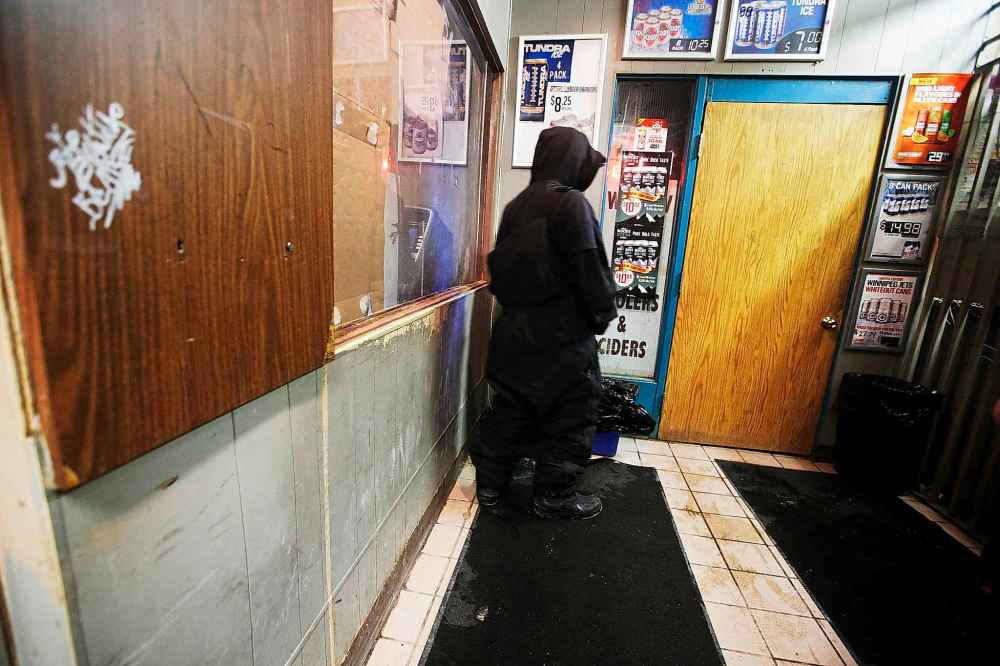
Tonight, people shiver in tents and makeshift camps, struggling to keep warm. They cuddle in the dark, sharing what little body heat they have left. They cram into warming centres and overnight shelters to escape the cold.
Their teeth chatter as they freeze on the streets. They worry what will happen in the night. They wonder how safe they’ll be. They imagine people wanting to do them harm lurking in the dark.
They keep moving, even though they’re tired. They strain to keep their eyes open as sleep bears down on them. They fight and beg and crawl their way into another cold morning.
This is where the city’s have-nots live. This is where Winnipeg’s lost souls call home.

Desirae, 31, emerges from a tent set up on city land across from the Salvation Army — the Sally Anne, as it’s known to residents. In recent months, a homeless camp has sprouted from the frozen ground like a weed growing through a crack in the concrete.
She stretches, lifting her arms above her head, then searches through the items scattered in the snow: shirts and pants, shoes and jackets, cigarette butts and syringes, bicycle parts and busted shopping carts, half-eaten food and firewood.
Picking through it, she settles on some clothing, brushes off the snow as best she can, and layers up. She’s chosen a flat-peaked baseball cap pulled low on her head, an oversized hoodie and snow pants. She applies dark lipstick and heads out into the night.
Her feet fall upon a familiar path, working the route she walks most nights: hitting dumpsters in the area searching for something to scavenge. Desirae hustles. She considers herself a survivor. She’s tough and her moods fluctuate. She’s smart and articulate, charming and charismatic.
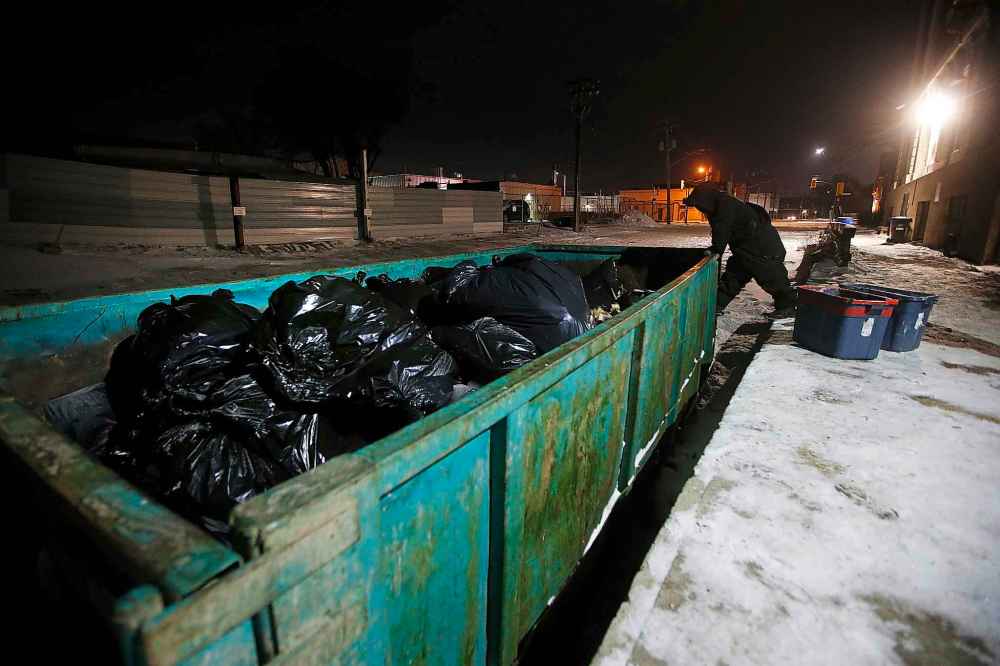
“We stay up all night. We keep moving. We stay active out in the bins. Every day. Not just to feed our addictions, but to live. We have to search for running water. We have to search for something to eat. We have to search for a place to go to the bathroom,” she says, rummaging through a bin.
“That alone is work. People may not realize it, but it is. Being out here is hard. Especially when you’re cold and you have to get out of your tent and you can’t find anything because it’s dark and all your batteries are dead, so you just have to wait for sunlight.”
She moves from one bin to another. All around her, the city continues to spin, and she continues to sharpen a skill set she’s been developing for the past nine months.
”We have to search for running water. We have to search for something to eat. We have to search for a place to go to the bathroom.”–Desirae
Desirae first left home at 13 but didn’t become homeless until the summer of 2019. Her background, while unique in detail, contains the hallmarks of trauma that often lead people to life on the streets: childhood sexual abuse, domestic violence, addiction.
For her, violence was the catalyst, the spark that finally burned her life to the ground. She’d been living a decent life, doing the best she could to keep her head above water, but it all went to shit the night he first hit her.
“I was fleeing an abusive relationship. I was with a man who attacked me,” she says.
It escalated and escalated and escalated, until one night Desirae says he pressed a blade to her throat. She felt she had two options — leave or die — so she left, even though she had nowhere to go.
“I left everything I had,” she says.
She was living in Calgary at the time. For a while, she stayed at a homeless shelter, but eventually her family in Manitoba told her to move to Winnipeg so she’d be closer to her home community of The Pas. But soon after she arrived, she washed up on the streets, where she’s been sleeping ever since.
She’s no longer in contact with her family. No one knows where she is.
“As of right now, I’m still a missing woman,” Desirae says. “A missing Aboriginal woman.”
”As of right now, I’m still a missing woman. A missing Aboriginal woman.”–Desirae
She keeps moving, heading east down Higgins Avenue, hitting dumpsters along the way. In a parking lot bordering the train tracks, she stops and sits down, smokes a cigarette and drinks a tall can of beer.
Unprompted, she mentions it’s been three days since she had a shower. When asked how that makes her feel, she says, “I don’t have time to feel.”
“All I have time for is to respond, in the moment, all the time, every single day. Out here, in the garbage bins, looking for clothes, looking for furniture, looking for batteries. Everything I wear is out of the garbage,” she says.
“Binning is almost therapy for me, a getaway from the bad things. I think it’s like that for a lot of people. They go binning because they don’t want to deal with rejection…. People get turned away too many times every day.”
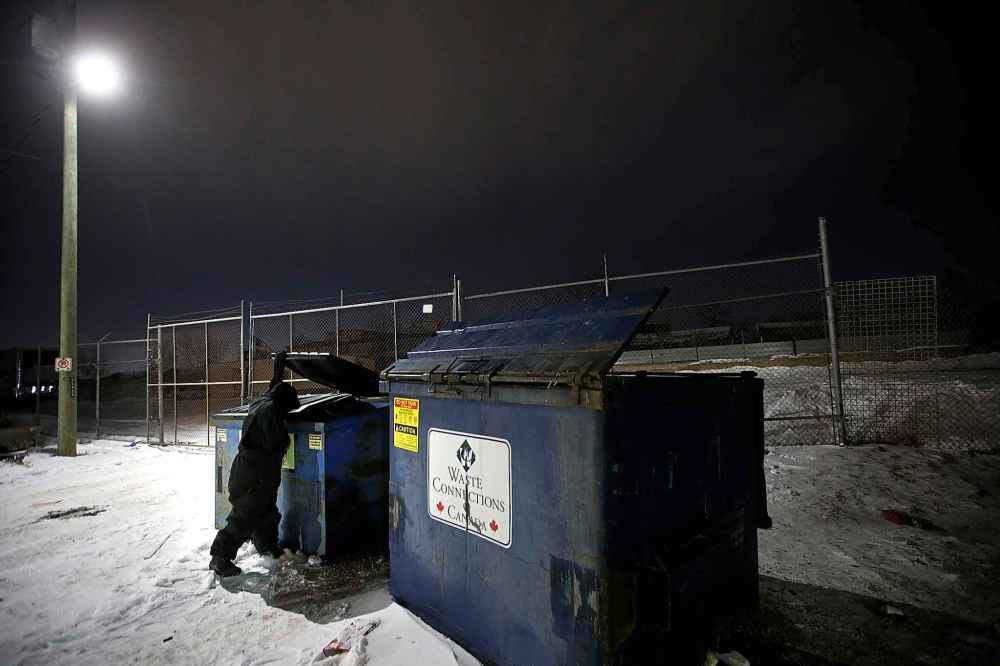
She finishes the cigarette and beer, then finishes up her route before heading back to the camp.
“Baby!” she shouts, as she walks up.
There’s a rustling inside one of the tents. Seconds later, Kyle — Desirae’s 27-year-old boyfriend — steps out and breathes in the open air. The pair met on the streets two months ago and have been dating ever since.
On their first date, they struggled to set up a tent together.
Kyle rummages through the items scattered on the ground until he finds something to wear. He changes into the outfit and asks if he looks all right.
“I’ve got to keep myself in line. The way I was dressed, I was actually f—ing feeling like shit, man. I felt like I couldn’t stand beside this one,” Kyle says, motioning toward Desirae.
“I just felt like a scrubbed-out little guy.”

Kyle says he’s been homeless since the day he moved to Winnipeg several years ago. He makes money binning and selling small amounts of methamphetamine to feed his addiction.
The temperature drops and the final minutes of the decade tick away.
Key numbers
● During the 2018 Winnipeg Street Census, volunteers found more than 1,500 individuals experiencing homelessness during a 24-hour canvass. But in their final report, the authors concede they likely undercount the homeless population by upwards of 3,000 people.
● From 2004 to 2016, 146 people died from exposure in Manitoba, with roughly one-third of those deaths happening in Winnipeg.
Standing in the cold, Kyle bums a cigarette, then struggles to light it with one of his many plastic lighters. He tries them one at a time, flicking over and over in vain, before moving onto the next one. Finally, the flame catches. The cigarette dangles from his mouth as he raises the fire to it.
He says it’s hard for people to understand life on the streets if they haven’t lived through it. Earlier this year, there was such a dark cloud hanging over him, stalking him wherever he went, he nearly killed himself.
“I almost lost it. I almost hung myself. I was going crazy. I was upset. Too much time and too much thought into things. I was just sitting there with the rope, thinking — thinking too much,” he says.
“I went to bed last night hoping that I’d freeze,” Desirae interjects, as if to point out Kyle isn’t alone in feeling that way.
“I didn’t want to wake up. I’m tired.”
But tonight, their spirits are high. They’re happy and in love.
“I went to bed last night hoping that I’d freeze. I didn’t want to wake up. I’m tired.”–Desirae
Kyle puffs the final drags on the cigarette, blows the smoke into the air, and drops it to the ground, stamping it out with his foot. Almost as an afterthought, he says, “Oh, shit.” He disappears into the tent, rummages around, and emerges holding a crumpled white box with a golden bow stuck to the top.
“It’s the small things that mean a lot,” he mumbles, handing the box to Desirae.
She rips it open and stares at the contents: a black and white dress. She drops the box and unfurls the dress in front of her.
“Happy New Year’s, baby,” Kyle says softly.
“I’m putting it on right now,” Desirae says, her voice a font of excitement.
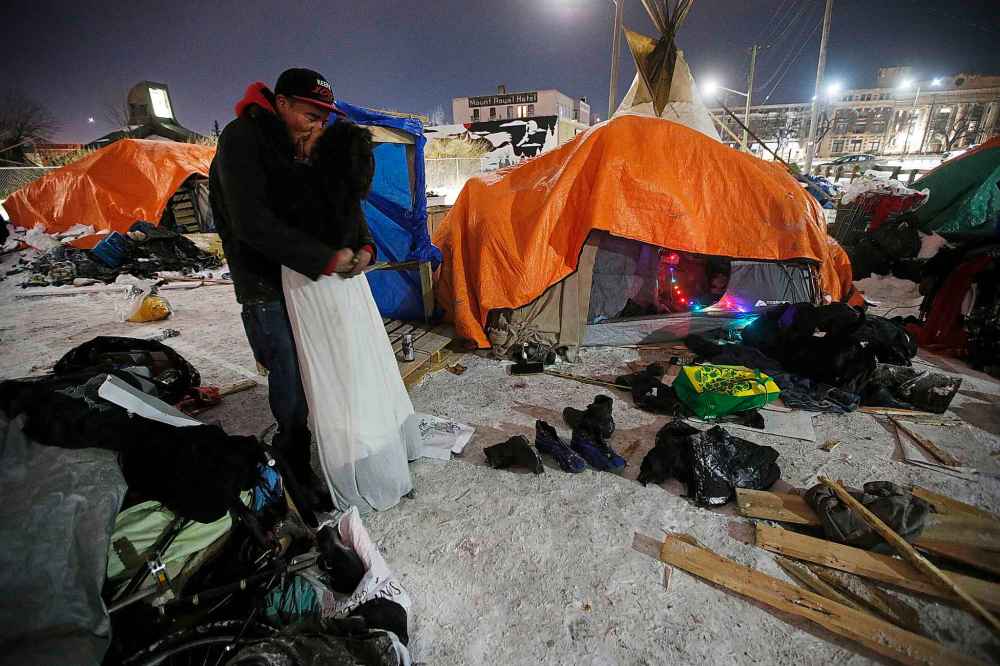
Kyle helps her change on the spot. She takes off the hat and hoodie, shivers in the cold, and slips into the dress. She clasps her hands together and throws her head back in laughter.
Stepping toward Kyle, she wraps her arms around him. They embrace, bring their lips together, kiss once, then again, before she whispers: “Thank you, baby.”
Desirae looks down and admires the dress. Kyle pulled it from a dumpster and did his best to clean it up for her. It’s what they do every day: scrape out a life from the things richer people throw away.
“Everybody’s nothing is our everything,” Desirae says, beaming with pride.
The darkness grows deeper, as if threatening to swallow them whole, as they stand in the clutter and chaos surrounding their tent. Desirae asks what time it is and, learning there are only 17 minutes left in 2019, tells Kyle it’s time to go.
“We’ve got to go to Main and Portage,” she says.
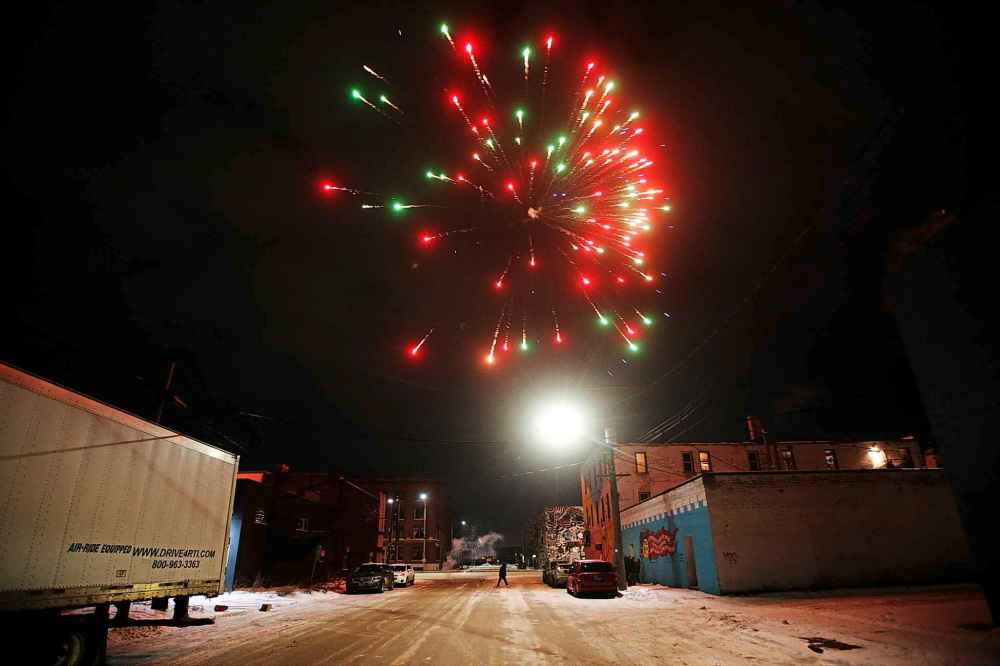
The couple walks off into the night, arm-in-arm, disappearing down a dirty back lane, their steps quick as they race to reach the intersection in time for the final countdown.
Once there, they’ll stare at a sky hanging like a dark tapestry pinned to the heavens, pitch black but studded with shinning stars.
And when the clock strikes midnight, and fireworks explode in the distance, illuminating the night, there will just be the two of them, standing in the dark, shivering in the cold, in love.
Surviving.
ryan.thorpe@freepress.mb.ca

Ryan Thorpe likes the pace of daily news, the feeling of a broadsheet in his hands and the stress of never-ending deadlines hanging over his head.
Our newsroom depends on a growing audience of readers to power our journalism. If you are not a paid reader, please consider becoming a subscriber.
Our newsroom depends on its audience of readers to power our journalism. Thank you for your support.
